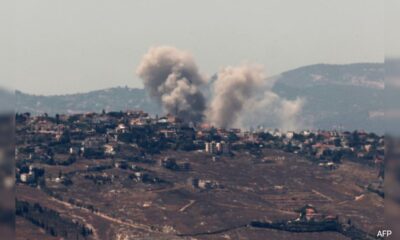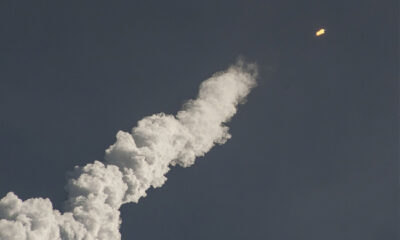Protesters in Iran celebrate after Tehran’s attacks on Israel
New Delhi:
Iran’s massive drone offensive against Israel comes against the backdrop of a nearly fifty-year-old rivalry that emerged in the wake of Iran’s 1979 revolution. Last year’s Hamas attack on Israeli cities and Tel Aviv’s brutal counterattack set off a war in Gaza, and Iran appears to be supporting several players, such as Hezbollah, in their offensive against Israel.
However, the drone attack is the first instance in which Iran launched an attack on Israel from its own territory. Tehran has underlined that it is an act of self-defense following Israel’s suspected attack on its embassy in Damascus, Syria earlier this month. Iran has now put the ball in Israel’s court, saying it hopes there will be no further escalation and that “the matter can be considered closed.”
Here we look at the factors and build-up that led to the escalation:
The origin
During the 1979 Iranian Revolution, the Pahlavi dynasty, which had aligned with the US, was overthrown and a theocratic dispensation led by Ayatollah Ruhollah Khomeini took power. Khomeini initiated a 180-degree shift in Tehran’s engagement with the US, describing the country as the Great Satan. He coined the nickname “Little Satan” for Israel because of its support of Mohammad Reza Pahlavi, Iran’s last monarch, its close ties with the US and tensions between Israel and Palestine.
As hostilities increased between Tehran and Tel Aviv, Khomeini also accused Israel of attempting to thwart Iran’s nuclear program.
For decades, both Tehran and Tel Aviv have attacked each other but denied their involvement in such offensives. Over the years, their conflict has been called a “shadow war.”
Lebanon and Syria emerged as two battlefields for this shadow war. Iran supported Hezbollah, which attacked Israel from Lebanese soil. In Syria, Tehran supported President Bashar al-Assad when Israel launched air strikes on Syrian territory. The Golan Heights, an area in Syria occupied by Israel after the 1967 war, is used by Tel Aviv for its attacks in Syria and Lebanon.
Hamas attacks Israel
On October 7 last year, Hamas operatives launched a shock attack on Israel’s cities, killing more than 1,200 people and taking more than 200 hostages. In public comments, Iran denied any role in the Hamas offensive but welcomed the attack on Israeli cities. According to reports, posters with messages such as “the great liberation has begun” appeared on prominent street squares in Tehran. Multiple media reports indicate that Iran actively supported Hamas operatives in planning and carrying out the attack on Israeli cities.
The October 7 attacks prompted a brutal counterattack from Tel Aviv, which launched a full-scale offensive into the Gaza Strip. According to UN estimates, more than 33,000 Palestinians have been killed in Israeli retaliation so far.
Hezbollah opened a new front by firing a volley of rockets at Israel from Lebanon.
The reason: the attack in Damascus
On April 1, suspected Israeli warplanes bombed the Iranian embassy in Syria. Tehran said seven military advisers, including senior commanders, were killed in the attack. “We strongly condemn this heinous terrorist attack that targeted the Iranian consulate building in Damascus and left a number of innocent people dead,” said Syrian Foreign Minister Faisal Mekdad.
Asked about the attack, an Israeli military spokesman said: “We do not comment on foreign media reports.”
Iran’s UN mission described the attack as a “blatant violation of the Charter of the United Nations, international law and the fundamental principle of the inviolability of diplomatic and consular premises.”
It urged the UN Security Council to condemn the attack and said Tehran reserves the right to “provide a decisive response”.
Hezbollah also vowed to take revenge, saying: “This crime will not pass without the enemy receiving punishment and revenge.”
The Drone Offensive
Last night Iran launched a barrage of drones and missiles targeting Israel. Iran’s military said the drone and missile strike “achieved all its objectives.” “Operation Honest Promise… was successfully completed from last night to this morning and achieved all its objectives,” Mohammad Bagheri, chief of staff of Iran’s armed forces, told state TV, AFP news agency reported.
The Israeli Defense Forces said most of the drones and missiles were successfully intercepted by the Iron Dome and the Arrow Aerial Defense System. “We have intercepted 99% of threats against Israel’s territory. It is a very significant strategic success,” said Israeli military spokesman Daniel Hagari.
Iran’s ally Syria said it has put its ground-to-air defense systems and major bases on high alert, according to reports.
Israeli Prime Minister Benjamin Netanyahu has vowed a decisive response, saying Tel Aviv has been preparing for a direct attack by Tehran for years.
Iran has warned that its response “will be much greater” than the drone strikes if Israel retaliates. The chief of Iran’s armed forces, General Mohammad Bagheri, has told state media that it will also target US bases if Washington backs Israel’s counterattack.














